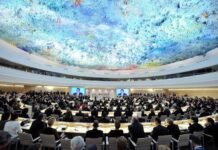Geneva, 14 April 2022 (TDI): “War, the climate crisis, and Covid-19 are driving up food and fuel prices” WHO Director-General Tedros Adhanom Ghebreyesus delivered these remarks at the opening ceremony of the World Health Organization’s press conference.
The death rate has decreased to 19 deaths due to Covid-19 since the onset of the pandemic. However, Covid-19 IHR Emergency Committee has agreed that the pandemic remains a public emergency.
Reporters, in case you missed it, here are @DrTedros’s remarks delivered at today’s presser, from #COVID19 to #Tigray to #Ukraine to #MentalHealth: https://t.co/UdTHy9d0Tc
— Gabby Stern (@gabbystern) April 13, 2022
World Health Organization (WHO) has updated its clinical management of Covid-19 guidelines over the last two years. This is a crucial time for investment in the impartial distribution of Covid-19 tool kits to strengthen health systems outlined in the 2022 WHO Strategic Preparedness and Response Plan.
Ghebreyesus emphasized bridging the vaccination equity gap to boost immunity in the population for preparedness against future waves. Accessible diagnostics, treatment, and testing should be available to everyone, everywhere, he added.
WHO scientists collaborate with experts worldwide to monitor, track, and identify new variants, including SARS-CoV-2 virus, BA.2, BA.4, and BA.5 Omnicron sub-lineages.
‘We continue to respond to the current pandemic; WHO is preparing for the next.’ The virus has become more transmissible and remains fatal for unvaccinated people and those who don’t have access to healthcare.
‘Continue wearing, masks-especially in crowded indoor spaces. And for the indoors, keep the air fresh by opening windows and doors, and invest in good ventilation.” said Ghebreyesus.
While talking about the war in Ukraine, the WHO Director-General verified 119 attacks on healthcare providers. During 50 days of the Russian invasion of Ukraine, 4.6 million refugees fled the country.
Thousands of civilians, including children, have died due to conflict. He urged on the need of establishing humanitarian corridors to safely deliver medical and food supplies to the people in need.
Only 1% of life-saving trucks were available to meet the needs of people during the blockade in Tigray, resulting in a continued siege by Ethiopian and Eritrean forces. ‘Unfettered humanitarian access’ is required to avert thousands of deaths in the seized area.
While talking about famine and food crisis in Africa, he highlighted that many people are already food insecure and starving, which can profoundly impact national and regional security.
Ghebreyesus emphasized that ‘there is no health without mental health” by sharing the details of online training by WHO for understanding and promotion of human rights and recovery of people with mental health conditions.








